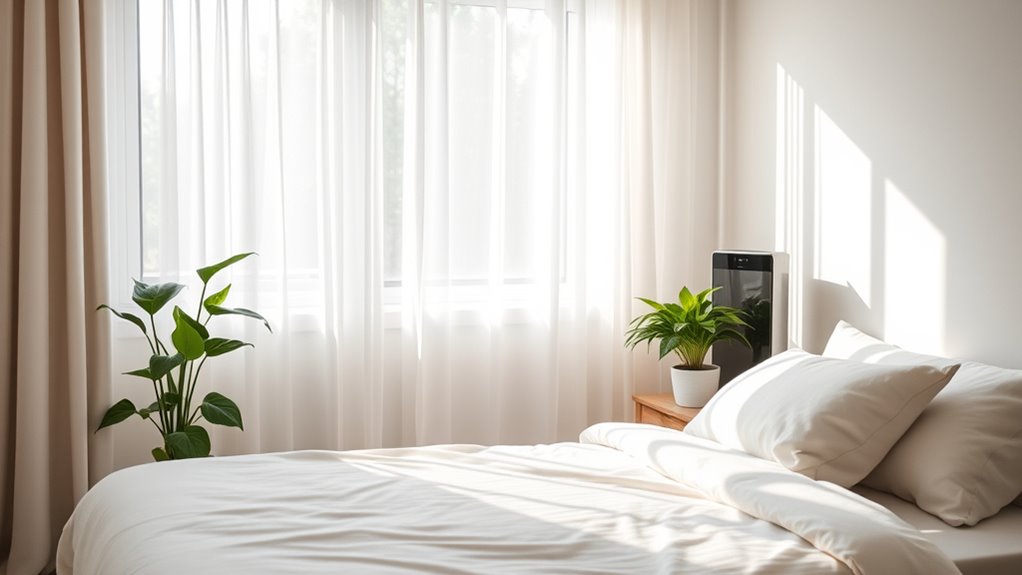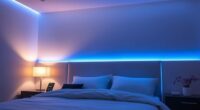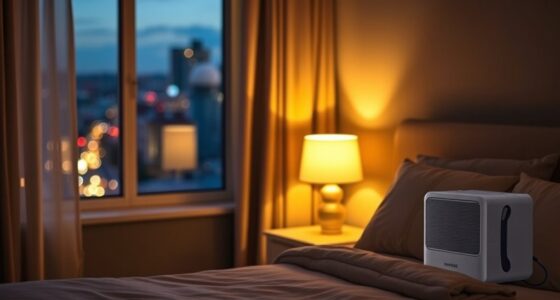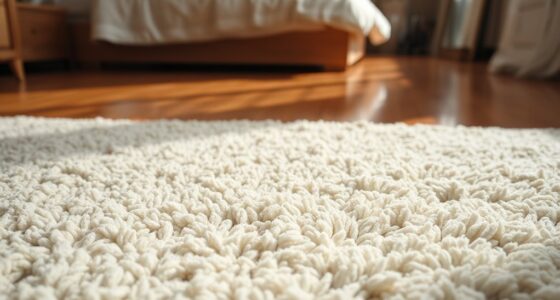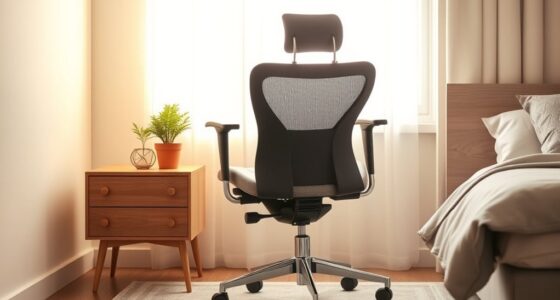Good air quality in your bedroom is vital for restful sleep and overall health. When the air is clean, you breathe easier, reducing allergies, congestion, and disruptions that interfere with restorative rest. Pollutants like dust, pet dander, and mold can cause discomfort and long-term health issues if unchecked. Using air purifiers with HEPA filters can make a big difference, creating a healthier sleep environment. Discover how to improve your bedroom air for better sleep and well-being.
Key Takeaways
- Good air quality reduces allergens and pollutants, leading to more restful and healthier sleep.
- Clean air minimizes respiratory irritants that cause coughing, congestion, and sleep disruptions.
- Using air purifiers with HEPA filters effectively removes airborne toxins, improving overall sleep quality.
- Improved indoor air supports immune function and decreases inflammation, promoting better long-term health.
- Maintaining optimal air quality creates a safer, more comfortable environment for restorative sleep.
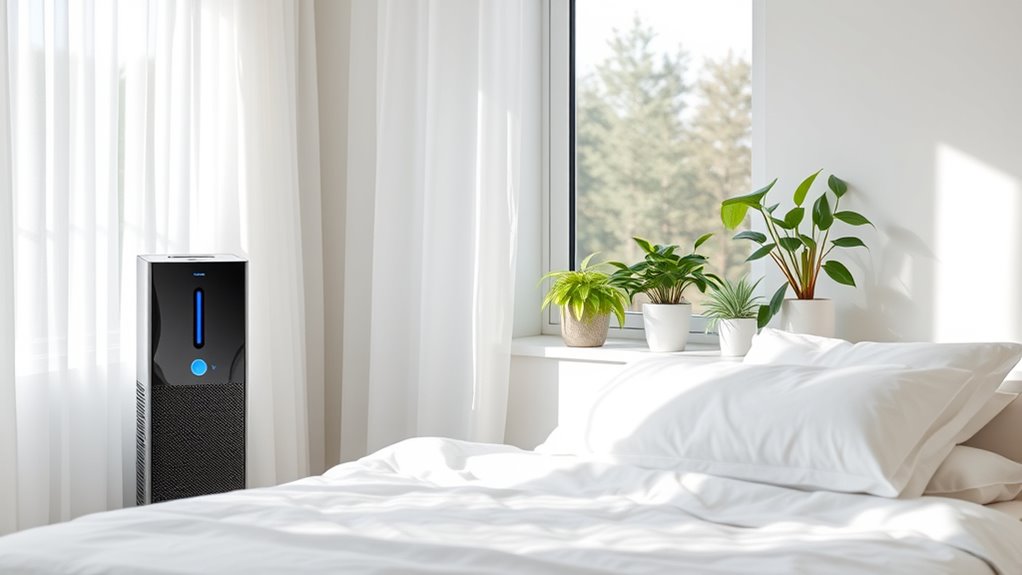
Have you ever wondered how the air in your bedroom affects your health and sleep quality? The truth is, the quality of the air you breathe while you sleep plays a vital role in how rested and refreshed you feel in the morning. Poor air quality can lead to restless nights, allergies, and even long-term health issues. That’s why investing in air purification systems is a smart move. These devices help remove pollutants, allergens, and airborne toxins, creating a cleaner environment that promotes better sleep. When your bedroom air is purified effectively, you breathe easier, which directly enhances your sleep quality. Clean air reduces irritants that can cause coughing, sneezing, or nasal congestion, all of which can disrupt your sleep cycle. You might not realize it, but even small particles like dust mites, pet dander, and mold spores can impact your breathing and sleep patterns. By incorporating air purification, you eliminate many of these common culprits, making your bedroom a sanctuary for restful sleep.
Think about the air you breathe during the night. If it’s filled with pollutants or allergens, your body works harder to get enough oxygen, and your sleep becomes fragmented. It’s not just about comfort; it’s about your overall health. Better air quality supports your immune system, reduces inflammation, and lowers the risk of respiratory issues. Using HEPA filters can be particularly effective in capturing airborne particles and improving indoor air quality. You don’t have to overhaul your entire home to see benefits—simply focusing on your bedroom’s air purification can make a significant difference. Regularly changing filters and using HEPA purifiers can drastically improve the air quality, which means you wake up feeling more energized and less groggy. Also, proper ventilation helps in reducing indoor pollutants, but it’s not always enough, especially in areas with high pollution levels. That’s where air purifiers come in as a dependable solution.
Creating an environment with ideal air quality isn’t just about health; it’s about your comfort and peace of mind. Think of it as setting the stage for restorative sleep, where your body can recover fully overnight. When you prioritize air purification, you’re actively improving your sleep quality and, ultimately, your overall well-being. It’s a simple step that can produce profound results, helping you wake up feeling more refreshed, alert, and healthier each day. Remember, good sleep starts with good air. Don’t underestimate the power of clean, purified air in your bedroom—it’s the foundation for a healthier, more energized life.

Amada Queen Adjustable Bed Frame with Massage, Head & Foot Incline, Wireless Remote, 4 Built-in USB Ports, LED Night Light, 4 Height-Adjustable Legs, Electric Bed Base, 01B-Q1
Charging & LED Lighting: This bed frame features a USB-A and USB-C charging port on each side, making...
As an affiliate, we earn on qualifying purchases.
Frequently Asked Questions
How Often Should I Change My Bedroom Air Filters?
You should change your bedroom air filters every 1 to 3 months, depending on usage and filter type. Regular air filter maintenance guarantees ideal air quality and system efficiency. Keep an eye on air quality monitoring results; if you notice increased dust or odors, it’s time to replace the filter sooner. Consistent maintenance helps maintain a healthy environment and prevents allergens from circulating in your bedroom.
Can Plants Improve Indoor Air Quality in the Bedroom?
You might wonder if plants can improve indoor air quality in your bedroom. While some plant varieties offer natural air purification, their impact is often limited compared to proper ventilation and air filters. Adding plants like pothos or snake plants can boost humidity and reduce toxins slightly, but don’t rely solely on them. For effective air quality, combine plants with good airflow and regular filter changes.
What Are the Signs of Poor Air Quality Affecting Sleep?
Ever noticed waking up tired or with a sore throat? Poor air quality can cause sleep disturbances and respiratory issues that affect your rest. You might also experience frequent sneezing, coughing, or headaches in the morning. These signs indicate your bedroom air isn’t healthy. To improve your sleep, check for drafts, increase ventilation, and use air purifiers. Don’t ignore these symptoms—they’re your body’s way of telling you something’s wrong.
Do Air Purifiers Eliminate All Airborne Allergens?
Air purifiers substantially improve air quality, but they don’t eliminate all airborne allergens. Their limitations include smaller particles slipping through filters or allergens settling quickly. The allergen removal efficiency varies depending on the device’s filter type and maintenance. You should choose an air purifier with a HEPA filter for better allergen removal, but remember, no purifier can guarantee complete elimination of all airborne allergens, so combining it with good ventilation helps even more.
How Does Humidity Impact Bedroom Air Quality?
Did you know that indoor humidity levels should stay between 30-50% for ideal air quality? When humidity is too high, it promotes mold growth, which can worsen allergies and respiratory issues. Proper humidity control helps prevent mold and keeps the air cleaner. Maintaining balanced humidity levels is essential for mold prevention and ensuring you breathe healthier air while you sleep.

Pipishell Queen Adjustable Bed Frame with Massage, Electric Bed Base with Head & Foot Incline, USB-A & USB-C Ports, LED Under-Bed Lighting, 4 Leg Height Options, and Easy 3-Step Assembly
Customizable Head & Foot Elevation: This queen adjustable bed base enables you to raise your head up to...
As an affiliate, we earn on qualifying purchases.
Conclusion
Think of your bedroom as a sanctuary where your breath weaves life into each new day. When the air is pure, it’s like a gentle embrace that nurtures your body and soul. But when pollutants linger, they cast shadows on your well-being, dulling your spirit. Prioritize fresh air and clean environments, and watch your health blossom like a vibrant garden. Remember, the quality of your air isn’t just breath—it’s the rhythm of your life’s melody.

Marsail NS3 Queen Smart Adjustable Bed Base | Zero Gravity, Anti-Snore, Dual Motor, and 4 USB for Quick 3-Min Assembly
Quick Setup & Memory Control: Assemble your base quickly with a 3-minute, tool-free setup. Easily find your ideal...
As an affiliate, we earn on qualifying purchases.

24 Pack-12 x 12 x 2 Inches Pyramid Designed Acoustic Foam Panels, Sound Proof Foam Panels Black, High Density and Fire Resistant Acoustic Panels, Sound Panels, Studio Foam for Wall and Ceiling
Exceptional Sound Absorption:These pyramid acoustic panels are engineered to effectively absorb sound waves, reducing echo and reverberation. With...
As an affiliate, we earn on qualifying purchases.
